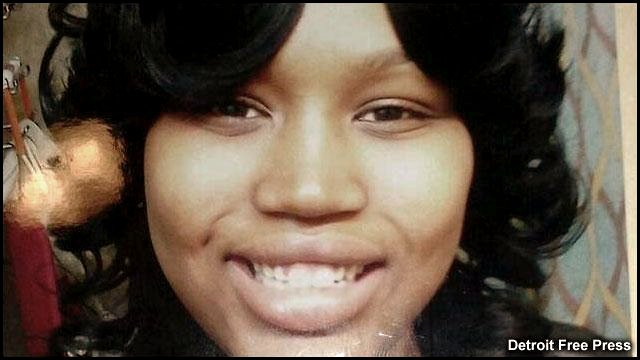

Renisha McBride
Detroit — A Wayne County jury on Aug. 7 found Theodore Wafer, 55, of Dearborn Heights, Mich., a Detroit suburb, guilty on all charges, including second-degree murder, in the death of 19-year-old African- American Renisha McBride. Wafer could face up to life in prison after a sentencing hearing scheduled for Aug. 25.
McBride’s killing on Nov. 2 prompted mass demonstrations demanding justice. The case attracted international attention when police did not initially arrest Wafer even though he admitted he had shot McBride to death outside his home.
McBride had been involved in a car accident just before she walked onto Wafer’s porch and began knocking on his door. Wafer came to the door and shot her and then gave contradictory statements regarding the reasons he killed her.
Wafer had initially told police that the shooting was an accident. However, when Wafer took the witness stand in his own trial he attempted to convince the jury that he was frightened by McBride and shot her thinking she was attempting to break into his home.
No damage was done to the house when McBride walked onto Wafer’s porch. She was not armed and made no attempt to enter the home forcefully.
Defendant’s lies exposed during trial
Wafer contradicted his initial statements to the police during testimony in the trial, revealing to the jury and observers that he was not credible.
According to CBS local news, “Prosecutors in their closing arguments repeatedly emphasized that Wafer had easier options than to directly confront McBride.” (Aug. 7)
“She was a young girl looking for help,” prosecutor Patrick Muscat told jurors. “What he did had to be immediately necessary and it wasn’t. It was reckless. It was negligent. I don’t know how to describe it. It was horrific,” said Muscat.
Muscat asked, “How about shutting the door? How about calling 911? No, what he does is he engages. He creates the confrontation.”
McBride’s parents appeared satisfied with the verdict. Monica McBride, Renisha’s mother, talked to reporters after the verdict was announced. “Her life mattered, and we showed that,” McBride stated. She said the prosecutors “did a wonderful job proving their burden that they had. … They had a heavy burden, but they made it through.”
Walter Simmons, McBride’s father, described Wafer as “a cold-blooded killer.” Simmons said: “He didn’t even know her. … She was a beautiful young lady, you know. She had things going for her.”
Racist killings not isolated
This verdict represented a departure from the often typical response of law enforcement agencies and prosecutors in pursuing cases involving violence carried out by whites against African Americans. With the tragic killing of McBride taking place a year after a “not guilty” verdict for George Zimmerman in the killing of 17-year-old Trayvon Martin, progressives and anti-racists did not want the same situation to prevail.
After the acquittal of Zimmerman in Florida, there were mass demonstrations and rebellions across the United States in July 2013. When police did not arrest Wafer in the shooting death of McBride, demonstrations were held in Dearborn Heights demanding that charges be filed by the Wayne County prosecutor.
The Aug. 9 police killing of Michael Brown, 18, in Ferguson, Mo., has sparked mass demonstrations and a rebellion led by African-American youth. Brown had just graduated from high school and was scheduled to begin college two days before his death.
Spotlighting another violent, racist incident, a video of Marlene Pinnock being beaten July 1 by a California Highway Patrol officer has received wide attention. Pinnock, who is African American, gave her first interview Aug. 10 after being released from the hospital for medical treatment for injuries sustained in the beating.
Pinnock said of the patrol officer that attacked her on the expressway, “He grabbed me, he threw me down, he started beating me, he beat me. I felt like he was trying to kill me, beat me to death.” (Associated Press, Aug. 10)
As the crisis within the capitalist system in the U.S. further deepens, racists and law enforcement agents will intensify their attacks on the oppressed. These acts of racist violence are well rooted within the history and political culture of the U.S., which was founded on the forced removal and genocide of the Native peoples as well as the abductions, enslavement and superexploitation of the African masses for over two centuries.
Mass organizations, civil rights groups and all concerned activists must mobilize nationally to effectively put an end to racist violence in all its forms. Through such a process, genuine multinational solidarity can be built, which will lay the basis for a society devoid of racism and national oppression.
The following call, “Gaza cries out to you – A global solidarity week to support…
Ever since the Donald Trump/Elon Musk administration took the reins of power in late January,…
The following is a letter from Workers World Party to the Workers Party of Korea…
Statement of the anti-imperialist Citizens’ Pole organization in Panamá, issued April 10, 2025. Translation: John…
Philadelphia Philadelphia’s transit system, the Southeastern Pennsylvania Transit Authority (SEPTA), released a budget on April…
By Gary Wilson The following is a guest article published first on April 10, 2025…